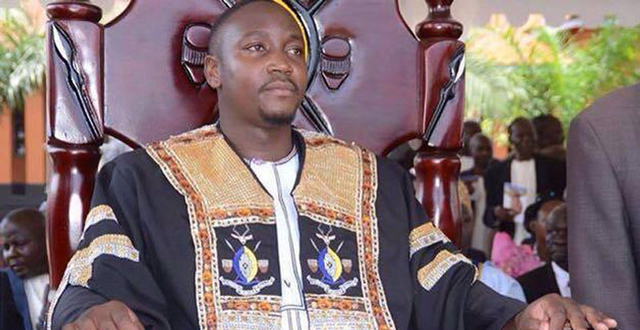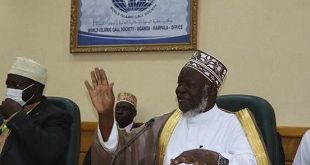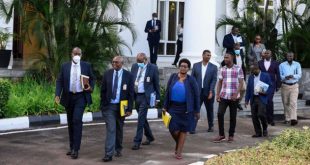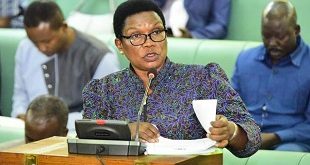
Jinja, Uganda | THE INDEPENDENT | The Constitutional Court has thrown out a petition challenging the election of the reigning Kyabazinga of Busoga, William Wilberforce Gabula Nadiope. Three Busoga loyalists including Dan Kawanguzi, a member of the Balangira clan from Busiki Chiefdom, Gideon Isooba from the Bulamogi Chiefdom and Harriet Nanyanga petitioned the Constitutional Court shortly after Gabula’s election on August 24th, 2014.
Gabula was duly elected by 10 out of the 11 chiefs who make the royal council in accordance with the Constitution of Obwa Kyabazinga Bwa Busoga. He was coroneted on September 13 2014 at Bugembe Kingdom headquarters in accordance with Busoga culture and customs. According to the record before Court, Nadiope’s election followed the nullification of the election of his rival Edward Columbus Wambuzi Zibondo on October 31st, 2008 for lack of quorum.
Dissatisfied with the process, the three petitioners ran to the Constitutional Court seeking among others the declaration that the decision of the Speaker of Parliament Rebecca Kadaga use her political influence to direct the conduct of parallel elections for the Kyabazinga in the absence of a vacuum was inconsistent with the constitution. The trio also accused Kadaga of directing the demolition of the perimeter wall at the Busoga Kingdom headquarters at Bugembe and subsequent eviction of all the Kingdom offices, which violated the kingdom constitution and norms.
In their petition, where the Attorney General and Kyabazinga Nadiope were listed as respondents, the trio asked Court to declare that the decision to elect Nadiope as the cultural leader of Busoga in the absence of a vacuum to the throne was inconsistent with the constitution. They also asked court to declare that the action of police restraining their legally elected and legitimate Kyabazinga of Busoga Edward Columbus Wambuzi Zibondo XIII from accessing his kingdom office at Bugembe to execute his duty as the Kyabazinga was inconsistent with the constitution.
The trio also asked the court to issue an order restraining Nadiope from holding out as the Kyabazinga of Busoga and order the respondents to pay damages and the cost of the suit. However, in their defense both Nadiope and the Attorney General opposed the petition, saying it does not raise any issue for constitutional interpretation. The Attorney General argued that the acts complained of and attributed to Kadaga and others did not violate the constitution. On his part, Gabula explained that he was duly elected and gazetted as the Kyabazinga of Busoga.
He argued that the purported election of his rival Wambuzi on August 31st, 2008 was null and void as it contravened the kingdom constitution. In their judgment, the five-member panel of the Constitutional Court judges led by the Deputy Chief Justice Richard Buteera dismissed the petition on grounds that it lacked merit.
“We have taken the liberty to examine the petition and the affidavits annexed thereto including annexures. We have also carefully studied the pleadings of all the respondents. We have not been able to find any questions as to the interpretation of the constitution’, the Justices started in their judgment. The other justices are Kenneth Kakuru, Catherine Bamugemereire, Christopher Madrama and Irene Esther Mulyagonja.
According to the Justices, the issues complained about by the petitioners were dealt with in other related cases and as such, they have no powers to re -entertain them. ‘The Government of the Republic of Uganda has no right to interfere in the lawful internal matters of a cultural institution. It appears to us, therefore, that questions for Constitutional interpretation raised here have already been determined by this court…. The dispute between the parties as outlined in the respective pleadings would be resolved by other means,” reads the judgment in part.
Although the Justices agree that there is a dispute between the parties, they note that the petitioners didn’t bring any evidence showing that their grievances cannot be resolved without the need to first interpret the constitution. They argued that the issues raised by the petitioners would be resolved by other means including taking them to High Court for judicial review of the election of the current Kyabazinga.
However, the judges declined to order costs, saying they had taken into consideration the nature of the relationship between the parties involved in the petition and the sake of fostering reconciliation.
********
URN
 The Independent Uganda: You get the Truth we Pay the Price
The Independent Uganda: You get the Truth we Pay the Price


